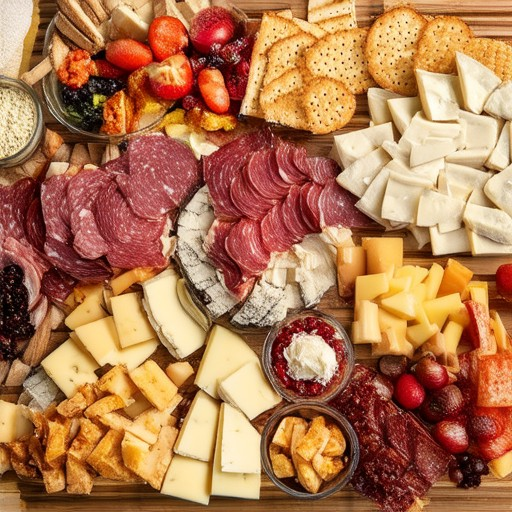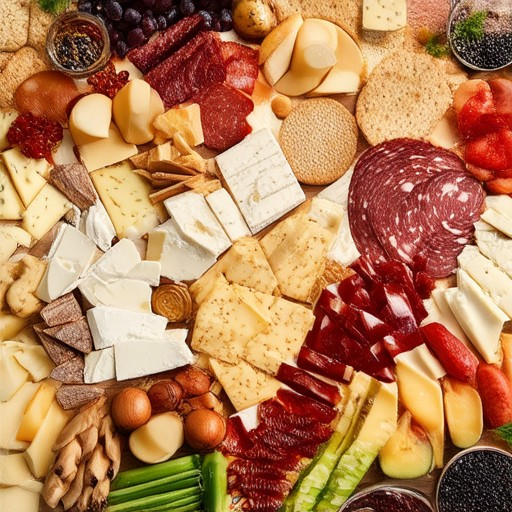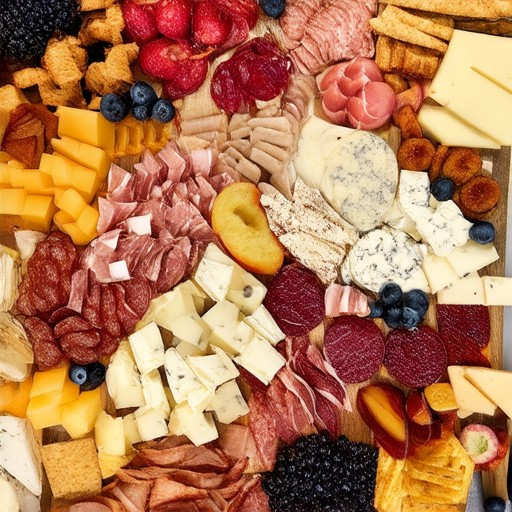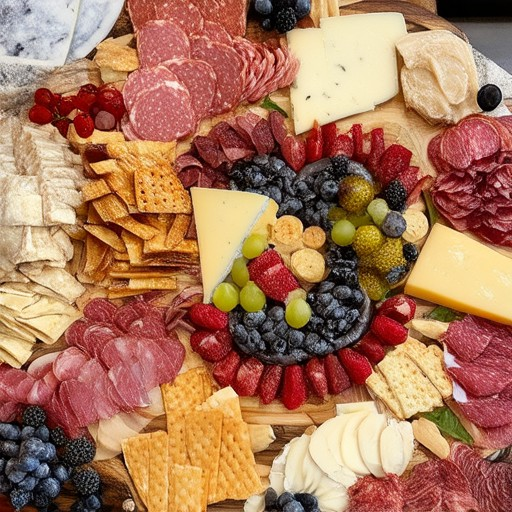Discover the perfect wine and charcuterie pairings to elevate your next gathering into a memorable experience. Whether you’re hosting a cheese party, a charcuterie board night, or simply looking to enhance your meal, finding the right wine to complement your favorite meats, cheeses, and accouterments can make all the difference. From bold red wines to crisp whites, there’s a perfect pairing for every taste preference. Learn how to create a charcuterie board that wows your guests and explore the best wines to pair with everything from classic cheeses to hearty meats. This guide will walk you through top picks, expert tips, and the secrets to throwing a cheese and wine night that no one will forget.
Key Takeaways
- Pair Bold Reds with Strong Cheeses: Opt for bold red wines like Cabernet Sauvignon to complement intense cheeses.
- Crisp Whites for Mild Cheeses: Choose crisp whites such as Chardonnay or Sauvignon Blanc for milder cheeses.
- Cheddar Loves Merlot or Sauvignon Blanc: Pair Cheddar with Merlot or a crisp Sauvignon Blanc.
- Brie Pairs Perfectly with Pinot Noir or Chardonnay: Brie shines with either Pinot Noir or a lightly oaked Chardonnay.
- Gouda Shines with Chardonnay or Gewürztraminer: Gouda pairs beautifully with Chardonnay or the spicy notes of Gewürztraminer.
- Water Crackers Are Neutral and Versatile: Use water crackers as a neutral base for both red and white wines.
- Sesame or Nut Crackers Add Flavor: Enhance earthy cheeses with sesame or nut crackers.
- Oatcakes Stand Up to Strong Cheeses: Opt for hearty oatcakes to match strong cheeses like Cheddar.
- Regional Wines Enhance Flavors: Burgundy wines are ideal for French cheeses, while Italian wines pair well with Parmigiano-Reggiano.
- Sparkling Wines for Celebrations: Prosecco or Brut Champagne are perfect for festive occasions.
- Beyond Wine: Explore Alternatives: Consider beer, white wines, bold reds, and unique beverages for a diverse experience.

What Wine Goes Well with Charcuterie?
When pairing wine with charcuterie, it’s essential to consider the flavors and textures of the meats and cheeses. Here’s a guide to finding the perfect match:
- Sparkling and Light-Body Wines: Crisp and bubbly wines like Prosecco or Champagne are excellent choices. Their acidity cuts through the richness of cured meats like salami or prosciutto, making them a versatile option.
- Dry Whites: Wines such as Pinot Grigio and Sauvignon Blanc are ideal due to their high acidity and aromatic profiles. These wines complement the variety of flavors found in charcuterie, from delicate cured meats to creamy cheeses.
- Red Wines: Lighter reds such as Pinot Noir and Grenache are great matches. These wines offer earthy and berry notes that pair well with the saltiness of meats and the tanginess of cheeses.
The key is to choose wines that complement the specific ingredients on your charcuterie board. For instance, a sweet Riesling might pair beautifully with paté or foie gras, while a robust red could stand up to hearty, smoked meats. Always consider the regional origins of the wine, as they often align with the flavors of the foods they’re paired with.
For more detailed wine pairing guides and expert recommendations, explore our wine pairing guides and wine tasting resources .
What to Drink with Charcuterie
When pairing drinks with charcuterie, the goal is to complement the flavors of cured meats, cheeses, and accompaniments. Here are some excellent beverage recommendations:
Red Wines
- Bold Reds: Full-bodied reds like Syrah, Cabernet Sauvignon, or Zinfandel pair well with cured meats like prosciutto and salami due to their robust flavors.
- Earthy Wines: Red wines with earthy notes, such as Burgundy or Chianti, complement the savory qualities of charcuterie.
Sparkling Wines
- Champagne or Prosecco: Sparkling wines are a classic choice, offering a crisp and clean counterpart to rich charcuterie.
White Wines
- Riesling: A slightly sweet white wine pairs beautifully with creamy cheeses and can handle the acidity of pickled vegetables.
- Sauternes: Its sweetness complements blue cheeses and other rich dairy products on the board.
- Chablis: A dry white wine that balances the richness of cheeses without overpowering them.
Cocktails
- Kir Royale: Made with champagne and cassis, this elegant cocktail pairs well with cured meats and artisanal cheeses.
- Bloody Mary: The spiciness of this cocktail complements the saltiness of charcuterie, making it a great choice for a hearty platter.
- Margarita: The tangy lime flavor adds a refreshing twist to the plate, particularly with grilled shrimp or ceviche.
Sweet and Fortified Wines
- Port or Sherry: These rich, sweet wines complement cured meats and can elevate the overall experience of the charcuterie selection.
Beers
- Lagers or Pilsners: Light and refreshing beers can act as a palate cleanser between bites of charcuterie, especially with dishes like smoked salmon or cornichons.
Digestifs
- Coffee or Digestivo: After enjoying your charcuterie, consider ending with an espresso-based drink or a digestivo liqueur to aid digestion and wrap up the meal.
By thoughtfully selecting these beverages, you can enhance the flavor profile of your charcuterie selection and create a memorable dining experience.

What Wine Goes Well with Cheese and Salami?
When pairing wine with cheese and salami, it’s essential to consider the flavor profiles of both the wine and the dishes. Here’s a breakdown of recommended wines that complement cheese and salami:
White Wines
White wines are generally a better fit for cheese and salami due to their acidity and lighter bodies, which help cut through the richness of the dishes.
- Riesling : Known for its high acidity and ability to complement fatty textures, Riesling pairs exceptionally well with creamy cheeses like Brie and Gruyère, as well as the tangy notes of salami.
- Sparkling Wines (e.g., Prosecco, Brut Champagne) : The effervescence of sparkling wines enhances the saltiness of cheeses and provides a refreshing contrast to the richness of salami.
- Rosé Wines : Rosés offer a balanced mix of fruit and acidity, making them ideal for pairing with both savory and slightly sweet dishes. They work well with mild cheeses and the herbal notes often found in salami.
- Chardonnay (Lighter Styles) : Crisp Chardonnays can pair well with harder cheeses like Parmesan and the earthy tones of salami.
- Grüner Veltliner : This Austrian white wine features peppery and herbal notes that complement the smokier aspects of salami and a variety of cheeses.
- Sauvignon Blanc : With its citrusy acidity, Sauvignon Blanc is a versatile option that works well with both soft cheeses and the robust flavors of salami.
Red Wines
While red wines can be challenging due to their boldness, certain varieties can complement cheese and salami effectively.
- Pinot Noir : Lighter reds like Pinot Noir can handle the complexity of cheeses and salami without overwhelming the palate. Look for wines with subtle earthy notes.
- Chianti (Tuscany) : Known for its versatility, Chianti pairs well with a variety of cheeses, including Parmesan, and can complement the umami flavors in salami.
- Dolcetto (Piedmont) : This medium-bodied red wine offers dried fruit and spice notes that can pair nicely with the savory elements of salami and cheeses like Grana Padano.
- Barbera (Piedmont) : Another Italian red wine, Barbera, can handle the richness of cheese and the boldness of salami with its dark fruit and herbal characteristics.
- Mourvèdre (Spain/France) : This red grape produces wines with smoky and spicy notes, making them a great match for the intensity of salami and strong cheeses.
General Tips
- Temperature : Serve white wines between 50-60°F and red wines between 60-68°F to enhance their flavors.
- Herbs and Spices : Wines with herbal or spicy notes can complement the aromatic qualities of salami and certain cheeses.
By choosing one of these wines, you’ll find a perfect match for your cheese and salami platter, ensuring a harmonious and enjoyable dining experience.

What Wine Goes Best with Cheese and Crackers?
When pairing wine with cheese and crackers, the perfect combination depends on the types of cheese and the wines’ characteristics. Here’s a guide to help you find the best matches:
Red Wine Pairings
- Merlot : Known for its medium body and soft tannins, Merlot pairs well with a variety of cheeses, including Cheddar, Brie, and Camembert.
- Pinot Noir : Lighter and aromatic, Pinot Noir complements mild cheeses like Mozzarella and Manchego, as well as stronger ones like Blue Cheese.
- Cabernet Sauvignon : Full-bodied with high tannins, it works well with intense cheeses like Roquefort and Stilton.
White Wine Pairings
- Chardonnay : Oak-aged Chardonnay is a versatile white wine that pairs nicely with cheeses like Gouda and Brie.
- Sauvignon Blanc : Crisp and refreshing, it complements fresh cheeses like Goat Cheese and mild Cheddars.
- Riesling : Sweet Riesling can pair with sweeter cheeses like Brie with fruits or sharper cheeses like Appenzeller.
Specific Cheese Recommendations
- Cheddar : Try a Merlot or a crisp Sauvignon Blanc.
- Blue Cheese : Pair with a bold red like Cabernet Sauvignon or a sweet Riesling.
- Brie : A Pinot Noir or Chardonnay enhances its buttery texture.
- Gouda : Opt for a rich Chardonnay or a spicy Gewürztraminer.
Crackers to Consider
- Water Crackers : Neutral and light, they pair well with both red and white wines.
- Sesame or Nut Crackers : Add crunch and flavor, complementing earthy cheeses.
- Oatcakes : Hearty and robust, they stand up to strong cheeses like Cheddar.
Regional Wines
- Burgundy Wines (Pinot Noir) : Ideal for French cheeses like Brie and Comté.
- Italian Wines (Chianti, Barbera) : Robust reds pair well with Italian cheeses like Parmigiano-Reggiano.
Sparkling Wines
- Prosecco or Champagne : Great for celebratory occasions, they pair well with lighter cheeses and as an aperitif.
For the best wine and cheese experience, experiment with different combinations and let your taste buds guide you. Remember, the perfect pairing is subjective and depends on your preferences and the occasion.
What Wine Goes Well with a Cheese Platter?
Choosing the right wine to pair with a cheese platter can elevate your dining experience. The compatibility depends on the types of cheeses and their flavor profiles. Here’s a guide to help you make the perfect selection:
Bold Reds for Strong Cheeses
- Cheeses : Aged Cheddar, Cheshire, Comté, Gruyère, aged Gouda, Pecorino, Manchego, Parmigiano-Reggiano
- Wines : Red wines with bold fruit flavors and smooth tannins work best. Consider Shiraz, Cabernet Merlot, Cabernet Sauvignon, Petite Sirah, Mourvèdre, or Grenache.
Crisp Whites for Mild Cheeses
- Cheeses : Brie, Camembert, Coulommiers, Mozzarella, ricotta, or fresh goat cheese
- Wines : Light, crisp whites like Chardonnay, Pinot Gris, or Sauvignon Blanc are excellent choices. Sparkling wines such as Prosecco or Brut can also complement these cheeses beautifully.
Specific Pairings to Remember
- Hard Cheeses : Opt for dry whites like Riesling or Grüner Veltliner to balance their sharpness.
- Blue Cheeses : Pair with rich, fruity reds like Syrah or a sweet white like Sauternes to complement their earthy notes.
- Flavored Cheeses (e.g., Smoked Gouda) : Try a robust red like Zinfandel or a creamy Chardonnay.
Regional Recommendations
- Spanish Cheeses (e.g., Manchego) : Pair with Tempranillo from Rioja.
- French Cheeses (e.g., Brie, Camembert) : Match with Burgundy’s Pinot Noir or a crisp Chardonnay.
Tips for Success
- Serve at the Right Temperature : Most wines should be served slightly cooler than room temperature to enhance their aromas and flavors.
- Let the Wine Breathe : Open the bottle ahead of time to allow the wine to develop and soften.
For more detailed wine pairing insights, explore our wine pairing guides on Fine Vines.

What Drink Goes Well with a Cheese Platter?
When pairing drinks with a cheese platter, it’s essential to choose beverages that complement the variety of cheeses presented. Here are some excellent recommendations:
- Beer:
- Lagers or Ales – These light beers are perfect for mild cheeses like Brie or Camembert.
- Blue Moon Ale – A Belgian-style witbier with coriander and orange peel, ideal for stronger cheeses like Stilton.
- White Wines:
- Chardonnay – Opt for a lightly oaked version to complement Brie and Camembert.
- Dry Riesling – Its acidity pairs well with hard cheeses like Parmesan.
- Red Wines:
- Pinot Noir – A light red wine that complements mild cheeses and adds a pleasant earthiness.
- Beaujolais – Known for its fruit-forward profile, it pairs well with softer cheeses.
- Sparkling Wines:
- Prosecco or Brut Champagne – These offer a refreshing contrast to rich cheeses.
- Unique Options:
- Gin & Tonic – A refreshing choice that pairs well with mild cheeses.
- Herbal Infused Soda or Flavored Seltzer – An alcohol-free option that provides a crisp finish.
For more insights into wine pairing, explore our wine pairing guides on Fine Vines.
Conclusion: The right drink enhances the cheese platter experience, balancing flavors and textures. Whether opting for beer, wine, or a unique option, the goal is to find a beverage that complements each cheese’s nuances, ensuring a delightful tasting session.



0 Comments